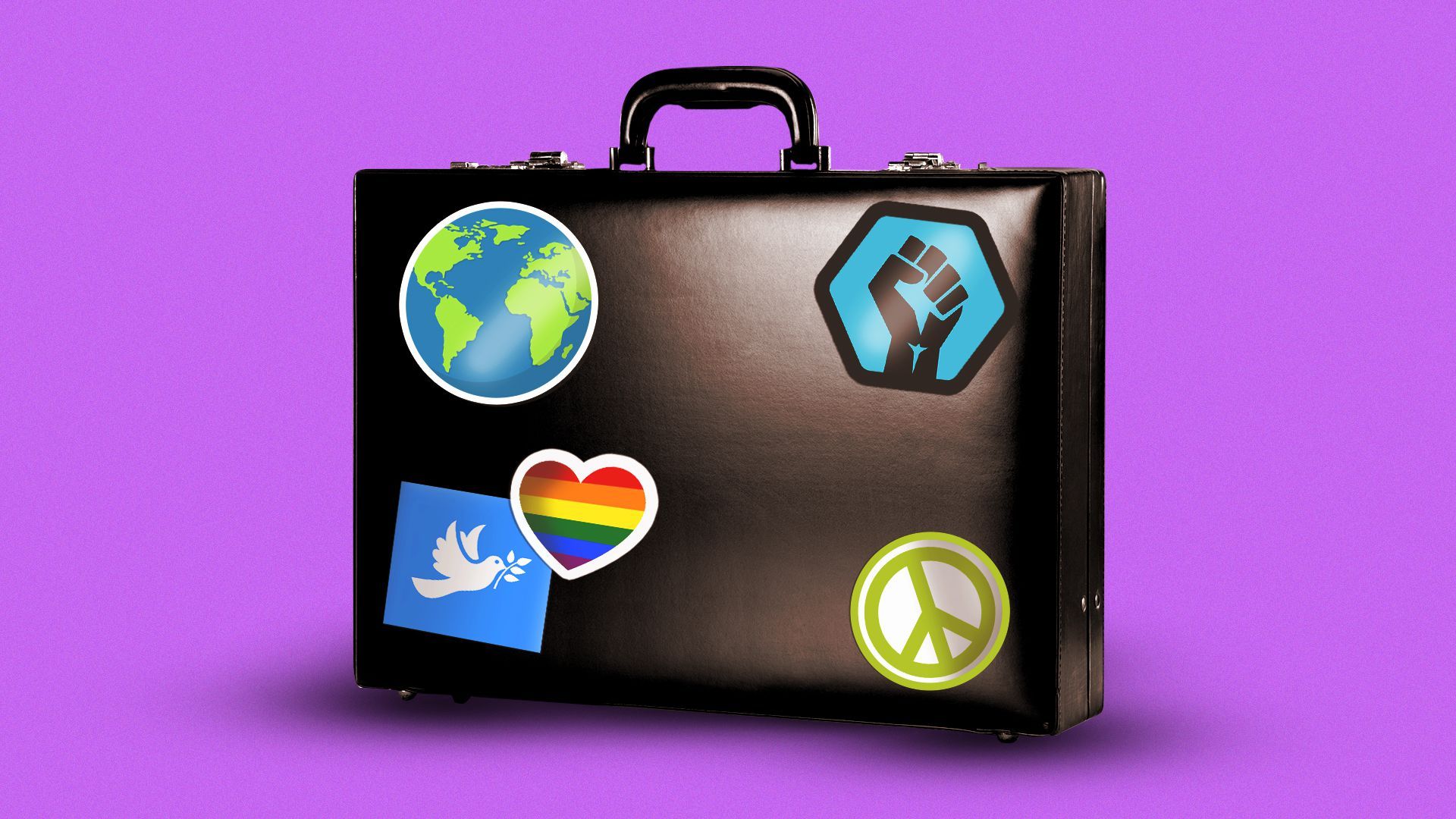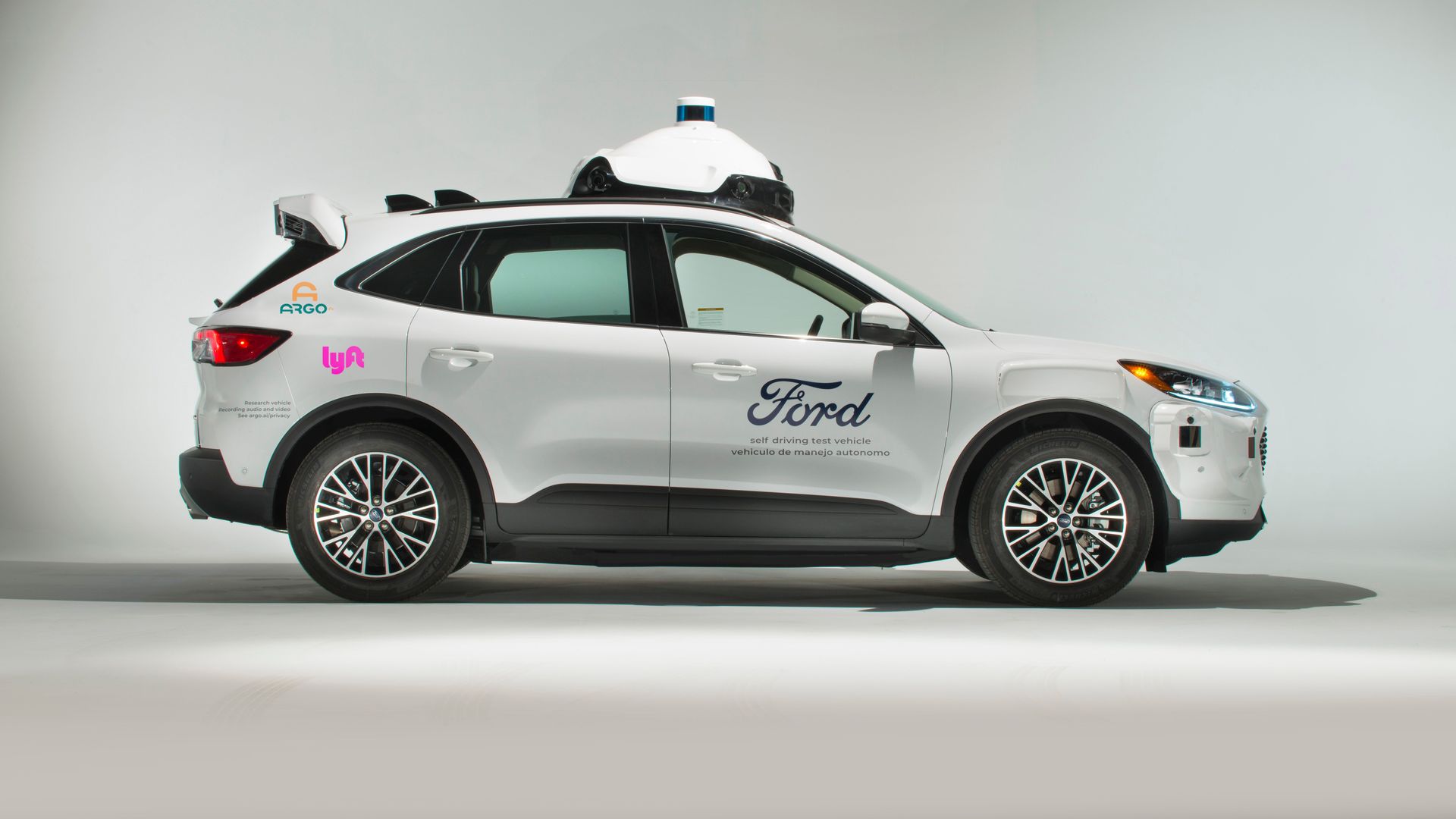| | | | | | | Presented By Malwarebytes Small Business Solutions | | | | Axios What's Next | | By Bryan Walsh, Erica Pandey and Joann Muller ·Jul 21, 2021 | | On Wednesday it's about the new social responsibilities of business, a real plan for robotaxis and how vegetarians beat inflation. "What was next" trivia: On this day in 1998, which famous American astronaut died? Hint: Like Jeff Bezos, he or she didn't actually orbit the Earth on his or her historic mission. - Credit to reader Jennifer Graham for being the first to note that Elvis Presley had his first public performance on July 20, 1954.
- Send your answer, along with tips and feedback, to whatsnext@axios.com.
Today's Smart Brevity count: 1,319 words ... 5 minutes. | | | | | | 1 big thing: The C-suite job of the future: Chief Purpose Officer |  | | | Illustration: Shoshana Gordon/Axios | | | | To appease employees, customers and shareholders alike, companies are spending time and money grappling with huge social problems like systemic racism, income inequality and climate change, writes Erica Pandey. What's happening: More and more firms are dedicating entire departments to tackle societal issues and even hiring a purpose-focused executive — chief purpose officer — to lead the efforts. Why it matters: In the past, firms generally just had to focus on their bottom lines. Now every political, social and environmental challenge is becoming a corporate concern as well. - A company's purpose or mission statement was originally about "what's within our four walls, but more and more it's about what's outside of our four walls," says Shannon Schuyler, chief purpose and inclusion officer at the consulting firm PricewaterhouseCoopers.
- Every day, firms are making new promises to cut emissions or hire and promote women and people of color. "But they don't have a singular person focusing on that," notes Kwasi Mitchell, Deloitte's chief purpose officer — which can mean those commitments aren't followed up on or met.
The big picture: "It's employees who are really driving this," says Paul Argenti, a professor at the Tuck School of Business at Dartmouth College. - The majority (60%) of people globally say their country will not be able to overcome its challenges without the involvement of business, Axios' Sara Fischer has reported, citing Edelman's Trust Barometer.
- Roughly 80% of people, on average, expect their company to act on issues such as vaccine hesitancy, climate change, automation, misinformation and racism.
- That means companies have little choice but to speak and act on social and political issues to recruit and retain employees.
- "People truly don't want to show up to their jobs and just get a paycheck anymore," Schuyler says. Employees, especially younger ones, will even quit if they don't feel a sense of purpose at work, she says.
Often companies fall short when they leave all of the purpose responsibilities to CEOs or heads of human resources. - That's where the chief purpose officer can come in, says Deloitte's Mitchell.
- "But it can't be in name only," he says. Purpose officers should have teams of people who can work on the bigger issues by collecting internal data on diversity and inclusion or researching philanthropic organizations firms can support.
- And "purpose officers should be embedded in all parts of the organization," Mitchell says, like marketing, sales and government relations, so they can ensure the company's day-to-day business is in line with its stated values.
What's next: Look for even more firms to create jobs — both executive and rank-and-file roles — around purpose as the pressure from inside and outside companies to do good keeps intensifying. Says Mitchell, "You can't sit on the sidelines anymore." Read the rest. |     | | | | | | 2. Robotaxis planned for deployment in Miami and Austin |  | | | The Ford self-driving robotaxi, which uses technology from Argo AI. Photo: Courtesy of Argo | | | | Ford and its self-driving technology partner, Argo AI, plan to deploy robotaxis on the Lyft ride-hailing network later this year, as autonomous vehicles inch closer to reality, writes Joann Muller. Why it matters: The AV technology race has narrowed to a half-dozen major players, including Pittsburgh-based Argo, which is backed by Ford and Volkswagen. But it has long been unclear how any of them will turn AVs into a viable commercial service. - Today's announcement offers one potential pathway to deploying robotaxis "at scale," according to Argo CEO Bryan Salesky.
What's happening: Ford will produce the fleet of vehicles, Argo will provide the autonomous technology and Lyft will supply the riders through its ride-hailing network. - "This collaboration marks the first time all the pieces of the autonomous vehicle puzzle have come together this way," said Lyft co-founder and CEO Logan Green. "Each company brings the scale, knowledge and capability in their area of expertise that is necessary to make autonomous ride-hailing a business reality."
Details: The autonomous ride-hailing service will launch in Miami later this year and in Austin, Texas, early in 2022. - Those initial services will lay the groundwork for deploying at least 1,000 autonomous vehicles across multiple markets over the next five years, the companies said in a joint press release.
The intrigue: The deal includes a unique "equity for data exchange" that will give Lyft a 2.5% stake in Argo in exchange for access to data about its network that will help validate Argo's commercialization strategy. - That stake is worth about $181 million, based on Argo's $7.25 billion valuation a year ago.
- Yes, but: Argo plans to go public in the next year or so and is likely to fetch a higher valuation, which would make Lyft's stake worth even more.
Read the rest. |     | | | | | | 3. Local COVID travel advisories could be returning |  | | | Illustration: Aïda Amer/Axios | | | | Chicago added three states and a U.S. territory to its COVID-19 travel advisory Tuesday, writes Bryan Walsh. The big picture: State- and local-level travel rules were a blunt-force approach to slowing the pandemic last year — and ones that often proved difficult to actually enforce. - But with vaccination rates in many states stalling and concern about the more contagious Delta variant growing, it's possible that they may return.
Driving the news: Unvaccinated travelers from Florida, Louisiana, Nevada and the U.S. Virgin Islands will be advised — though not required — to obtain a negative COVID-19 test no more than 72 hours before coming to the city, or quarantine for 10 days upon arrival, the Chicago Department of Public Health (CDPH) said Tuesday. - Last week, Missouri and Arkansas were added to the advisory list, which had been at zero for several weeks with no states surpassing Chicago's threshold of 15 cases per day per 100,000 residents.
What to watch: Internationally, travel restrictions are mostly receding as vaccinations spread, with Canada on Monday announcing it would end mandatory quarantines for fully vaccinated U.S. travelers on Aug. 9. The bottom line: Other localities may follow Chicago's lead as persistently low vaccination rates in some states result in growing outbreaks. - But it's difficult to see the will returning for truly effective, enforceable domestic travel restrictions.
Read the rest. |     | | | | | | A message from Malwarebytes Small Business Solutions | | Secure your business devices and data from cyberattacks today | | |  | | | | Now you can buy business cyber protection direct from Malwarebytes. Choose from top-rated easy-to-use next-generation antivirus solutions for teams or centrally managed cloud-based endpoint protection and endpoint detection and response, all including phone support. | | | | | | 4. CO2 emissions are heading for a new record |  Reproduced from an IEA report; Chart: Axios Visuals The new IEA analysis projects that global carbon emissions are heading for a new record despite some green provisions in governments' recovery plans to date, writes Ben Geman. The big picture: Check out the middle line in the chart above. - It shows IEA's top-line finding that even if the clean energy measures in nations' recovery measures to date are implemented, energy-related CO2 emissions — that is, the lion's share — will keep rising.
- The provisions and the private resources they would leverage lead to lower emissions than would have occurred absent the efforts, but it's nothing close to an emissions trajectory consistent with Paris Agreement targets.
The bottom line: "The sums of money, both public and private, being mobilised worldwide by recovery plans fall well short of what is needed to reach international climate goals," IEA said in a statement alongside the analysis. |     | | | | | | 5. 1 food thing: Vegetarians beat inflation |  | | | Illustration: Brendan Lynch/Axios | | | | America's vegetarians and vegans are winning the inflation fight as meat prices go up while veggies get cheaper, writes Erica. By the numbers: In June, Americans shelled out 6% and 5% more for beef steaks and roasts respectively. And they paid 5% more for pork chops, according to Consumer Price Index data reported by MarketWatch. - Meanwhile, canned vegetable prices dropped by 1.2% and frozen by 0.7%.
- Another headache for meat lovers: Fast food chains are dealing with a fried chicken shortage as the country continues to feel the repercussions of the pandemic's disruption of meat-packing plants.
The big picture: About 5% of Americans are vegetarian and 3% are vegan, per Gallup. Despite greater attention to meat alternatives, that rate hasn't changed much in the last couple of decades. Share this story. |     | | | | | | A message from Malwarebytes Small Business Solutions | | Secure your business devices and data from cyberattacks today | | |  | | | | Now you can buy business cyber protection direct from Malwarebytes. Choose from top-rated easy-to-use next-generation antivirus solutions for teams or centrally managed cloud-based endpoint protection and endpoint detection and response, all including phone support. | | |  | | It'll help you deliver employee communications more effectively. | | | | | | Axios thanks our partners for supporting our newsletters. If you're interested in advertising, learn more here.
Sponsorship has no influence on editorial content. Axios, 3100 Clarendon Blvd, Suite 1300, Arlington VA 22201 | | | You received this email because you signed up for newsletters from Axios.
Change your preferences or unsubscribe here. | | | Was this email forwarded to you?
Sign up now to get Axios in your inbox. | | | | Follow Axios on social media:    | | | | | |
No comments:
Post a Comment